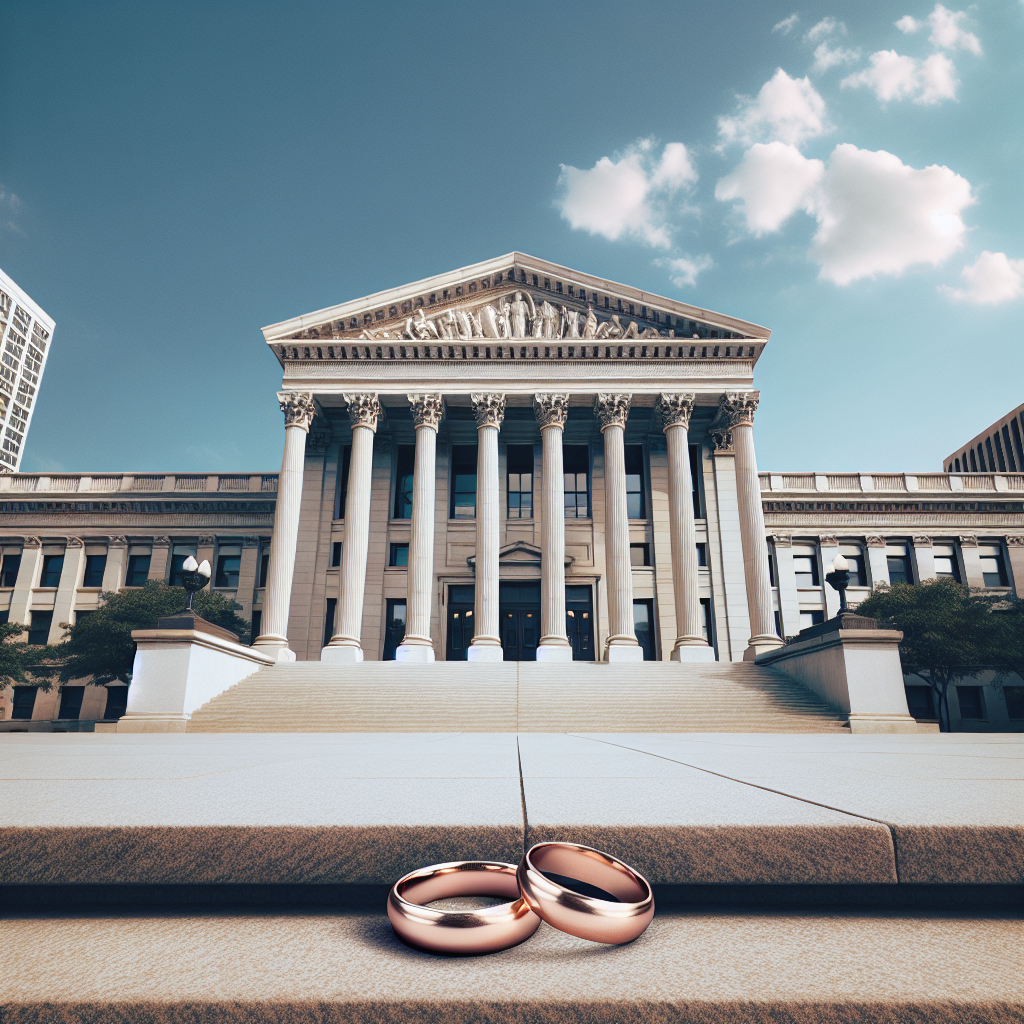The recent decision by the Supreme Court to decline a request for reconsideration of its 2015 ruling on same-sex marriage has significant implications for the ongoing debate surrounding LGBTQ+ rights in the United States. This decision stemmed from a case involving Kim Davis, a former county clerk in Kentucky, who had previously refused to issue marriage licenses to same-sex couples. The refusal led to legal challenges that ultimately questioned the constitutional basis for same-sex marriage.
Background of the Case
The controversy began after the landmark Supreme Court decision in Obergefell v. Hodges, which established a constitutional right to same-sex marriage. Kim Davis, in her capacity as a county clerk, became a focal point of this issue when she denied a marriage license to a same-sex couple, David Moore and David Ermold, citing her religious beliefs. Following her refusal, Davis halted the issuance of marriage licenses altogether, impacting both same-sex and opposite-sex couples.
This situation escalated into two lawsuits: one from Moore and Ermold, who argued that their constitutional right to marry had been violated, and another that challenged Davis’s blanket refusal to issue any marriage licenses. A federal district judge ruled against Davis, ordering her to comply with the law and issue licenses to all couples. Despite this ruling, Davis continued to resist, leading to further legal battles.
Supreme Court’s Decision
On Monday morning, the Supreme Court issued a brief, unsigned order denying Davis’s petition for review. This petition sought to overturn the 2015 decision in Obergefell, claiming that the right to same-sex marriage lacked constitutional grounding. As is customary when the Court declines to hear a case, no explanation was provided for this decision, leaving many to speculate on the internal dynamics of the Court.
The refusal to hear the case means that the lower court’s ruling, which upheld the award of $100,000 to Moore and Ermold for damages incurred due to Davis’s actions, stands. This ruling serves as a reaffirmation of the rights established in Obergefell, further solidifying the legal framework supporting same-sex marriage in the United States.
Implications for LGBTQ+ Rights
The Supreme Court’s decision not to engage with Davis’s petition underscores the ongoing legal and social acceptance of same-sex marriage. Many advocates view this as a victory for LGBTQ+ rights, reinforcing the notion that such rights are now firmly embedded within the constitutional framework. The legal battles that arose from Davis’s actions reflect broader societal tensions regarding marriage equality and religious freedom.
As the landscape of LGBTQ+ rights continues to evolve, cases like this highlight the importance of judicial interpretations of the Constitution. The Court’s dismissal of the case indicates a reluctance to revisit settled law, which could have far-reaching effects on future legal challenges related to marriage equality.
Future Legal Landscape
With the Supreme Court’s decision, the focus may shift to state legislatures and local governments, where similar conflicts between personal beliefs and legal obligations could arise. The situation in Kentucky, where the state enacted a law to accommodate county clerks like Davis, illustrates how legal frameworks can adapt in response to individual beliefs while still upholding constitutional rights. Advocates for both LGBTQ+ rights and religious freedom will likely continue to navigate this complex terrain.
For those interested in ongoing developments in Supreme Court cases, supreme court case updates provide valuable insights into how legal precedents are being shaped. Furthermore, the intersection of free speech and individual rights is being tested in various contexts, as seen in a landmark lawsuit on rights that addresses these issues directly.
The recent decision by the Supreme Court to decline a request for review regarding the constitutionality of same-sex marriage has reignited discussions surrounding the landmark ruling in Obergefell v. Hodges. This ruling, which established a constitutional right to same-sex marriage, remains a pivotal point in the ongoing discourse about LGBTQ+ rights in the United States. The case at hand involved Kim Davis, a former county clerk in Kentucky, who refused to issue marriage licenses to same-sex couples, citing her religious beliefs.
The Background of the Case
The dispute originated in 2015 when Kim Davis, after the Supreme Court’s decision in Obergefell, refused to issue a marriage license to David Moore and David Ermold, a same-sex couple. Davis justified her actions by claiming she was acting under “God’s authority,” which led to significant legal ramifications. Following her refusal, both Moore and Ermold filed lawsuits, asserting that their constitutional right to marry was being violated. In a notable ruling, U.S. District Judge David Bunning mandated that Davis must issue licenses to all couples, regardless of sexual orientation.
Despite the court’s ruling, Davis continued to deny licenses to Moore and Ermold, prompting further legal actions. The situation escalated to the point where Kentucky eventually passed legislation aimed at accommodating clerks like Davis, enabling the removal of their names from marriage licenses. This legislative change was indicative of the broader tensions between personal beliefs and the legal rights of individuals seeking marriage licenses.
The Supreme Court’s Decision
On a recent Monday, the Supreme Court issued a brief, unsigned order, rejecting Davis’s petition to review her case and overturn the 2015 ruling. The court’s decision not to hear the case was met with mixed reactions, as it did not provide any rationale for its choice. This lack of explanation is typical when the court denies petitions for review, leaving many to speculate about the justices’ perspectives on the matter.

In her petition, Davis argued that the right to same-sex marriage had no constitutional basis, seeking to overturn the precedent established by Obergefell. However, the Supreme Court’s refusal to engage with her arguments suggests a continued affirmation of the rights recognized in that 2015 decision. The implications of this ruling extend beyond Davis’s individual case, affecting the broader legal landscape concerning marriage equality.
Implications for Future Cases
The Supreme Court’s decision not to review the case has significant implications for future legal battles surrounding LGBTQ+ rights. By upholding the precedent set in Obergefell, the court reinforces the notion that same-sex marriage is a constitutional right. This decision may deter similar challenges to marriage equality, as it signals a reluctance to engage with arguments seeking to undermine established rights.
Furthermore, the case highlights the ongoing tensions between individual beliefs and the legal obligations of public officials. The situation faced by Davis serves as a reminder of the complex interplay between personal convictions and the enforcement of constitutional rights. As states continue to navigate these issues, the legal framework surrounding marriage licenses and LGBTQ+ rights will likely evolve, reflecting societal changes and judicial interpretations.
For more insights on related legal matters, one can examine the supreme court ruling on various rights cases, including those concerning personal identification. Additionally, the outcomes of landmark whistleblower case rulings illustrate the court’s approach to individual rights versus institutional policies. Finally, the court ruling on funding also reflects ongoing debates about governmental responsibilities and individual rights.
The recent decision by the Supreme Court to decline a request from Kim Davis, a former county clerk in Kentucky, marks a significant moment in the ongoing discussion surrounding the constitutionality of same-sex marriage. The court’s refusal to hear the case underscores its stance on the issue following the landmark ruling in 2015, which established same-sex marriage as a constitutional right. This decision not only reflects the court’s commitment to uphold previous rulings but also highlights the complexities involved in cases related to religious beliefs and civil rights.
Background of the Case
The dispute originated over a decade ago, particularly after the Supreme Court’s decision in Obergefell v. Hodges, which affirmed the right to same-sex marriage. Kim Davis, who held the position of county clerk, refused to issue marriage licenses to same-sex couples, citing her religious beliefs as the basis for her actions. This refusal led to legal challenges from David Moore and David Ermold, a same-sex couple who argued that their constitutional right to marry was being violated. The controversy escalated when Davis stopped issuing marriage licenses altogether, impacting both same-sex and opposite-sex couples.
In response to her refusal, U.S. District Judge David Bunning ordered Davis to comply with the law and issue licenses to all couples. Despite this order, Davis continued to deny licenses, asserting that she was acting under divine authority. Her actions prompted further legal action, culminating in a federal appeals court ruling that upheld a monetary award to Moore and Ermold, who were denied their marriage license.

Supreme Court’s Decision
The Supreme Court’s recent decision to reject Davis’s petition for review signifies a reinforcement of the legal precedent set by Obergefell. The court’s unsigned order did not provide an explanation for its refusal to hear the case, a common practice when denying petitions. The lack of public dissent among the justices regarding this decision indicates a consensus on the matter, reinforcing the established legal framework surrounding same-sex marriage.
Moreover, the court’s choice not to engage with Davis’s arguments against the constitutionality of same-sex marriage reflects a broader trend in judicial decisions favoring the rights of same-sex couples. By declining to revisit the Obergefell ruling, the Supreme Court effectively signals its unwillingness to entertain challenges that seek to undermine the legal recognition of same-sex marriage. This outcome is particularly significant in light of ongoing debates about the intersection of religious beliefs and civil rights.
Implications for Future Cases
The implications of the Supreme Court’s decision extend beyond the immediate case involving Kim Davis. It sets a precedent for future legal challenges related to same-sex marriage and the rights of public officials who may invoke religious beliefs in their official capacities. As legal battles continue to unfold across the country, the court’s stance may influence how lower courts handle similar disputes.
Furthermore, the decision may impact legislative actions at both state and federal levels. States may need to consider how to accommodate the rights of same-sex couples while balancing the religious freedoms of public officials. This delicate balance will likely be a focal point of future discussions and legal interpretations.
For those interested in understanding more about the dynamics of the Supreme Court’s approach to such cases, the supreme court oral arguments provide valuable insights into how justices navigate complex legal and ethical issues. As the landscape of marriage equality continues to evolve, the court’s decisions will play a crucial role in shaping the rights of individuals across the nation.